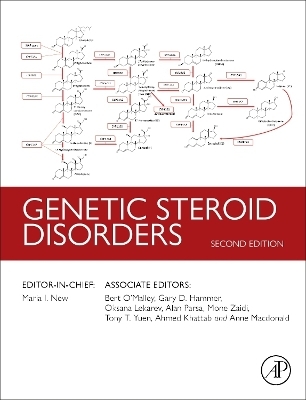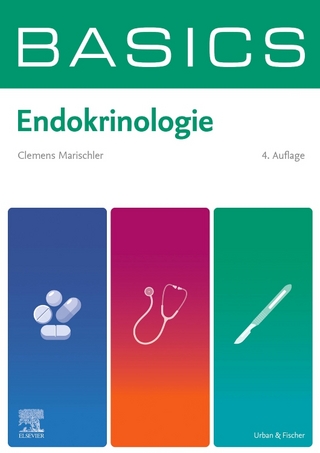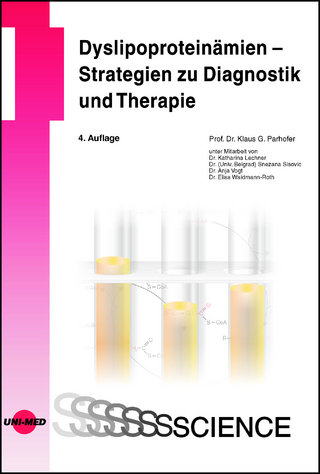
Genetic Steroid Disorders
Academic Press Inc (Verlag)
978-0-12-821424-4 (ISBN)
Dr. New received her Bachelors degree from Cornell University and her Doctor of Medicine degree from the University of Pennsylvania, where she was awarded the Distinguished Graduate Award. She was Chairman of Pediatrics at Weill Medical College of Cornell University from 1980 to 2002 and Founding Director of its Children’s Clinical Research Center, where she also served as Chief of Pediatric Endocrinology from 1964 to 2002. Dr. Maria New is Professor of Pediatrics, Professor of Genetics and Genomic Sciences, and Director of the Adrenal Steroid Disorders Program at Mount Sinai School of Medicine in New York City. She is also serving as Associate Dean for Clinical Research at the Florida International University Herbert Wertheim College of Medicine. Former president of the Endocrine Society, Dr. New has edited or co-edited 12 medical textbooks, published more than 600 peer-reviewed papers and served as editor-in-chief of the Journal of Clinical Endocrinology and Metabolism. She has trained more than 100 young physician-scientists who have become chiefs of pediatric endocrinology and leaders in their field. Her research, clinical work and teaching have taken her around the world. In 2005 and 2006, she led genetics research expeditions to Siberia in collaboration with the School of Medicine, St. Petersburg University, Russia. Dr. New’s contributions have been recognized by her being selected as one of the few pediatricians in the National Academy of Sciences. She has received numerous honors including: the Robert H. Williams Distinguished Leadership Award; the Rhone-Poulenc Rorer Clinical Investigator Award from the American Endocrine Society; the 1996 Dale Medal, the highest award given by the British Endocrine Society; and the 2003 Fred Conrad Koch Award, the highest award given by the American Endocrine Society. In 2010, she received the Van Wyk Prize, the highest award given in pediatric endocrinology. She has conducted pioneering research in the area of Congenital Adrenal Hyperplasia, a term used to describe a family of monogenic autosomal recessive disorders of steroidogenesis in which enzymatic defects result in impaired synthesis of cortisol by the adrenal cortex. In addition, Dr. New discovered a new form of hypertension, Apparent Mineralocorticoid Excess, which opened a new field of receptor biology. She was also the first to describe Dexamethasone-Suppressible Hyperaldosteronism, another form of low-renin hypertension. In 1999, she reported what may be the first example of a transcription factor defect in human beings. Dr. Bert O’Malley was first to discover that nuclear receptors are transcription factors that regulate specific mRNA production in target cells in response to intracellular hormones. He uncovered mechanisms for activating steroid receptors, and discovered the existence of ‘coactivators’, the ‘master genes of transcription that regulate normal and disease functions in reproduction, growth and metabolism. He developed the concept that small molecule drugs can regulate coactivators to produce therapeutic outcomes for diseases such as cancer and heart disease. Dr. O’Malley is the founding father of the field of Molecular Endocrinology and a member of the National Academy of Sciences, National Academy of Medicine, and National Academy of Inventors. Gary Hammer, MD, PhD serves as Director of the Endocrine Oncology Program in the Rogel Cancer Center at the University of Michigan where he holds the Millie Schembechler Professorship in Adrenal Cancer. The Program is recognized as a worldwide leader in endocrine cancers - exemplified by its recent leadership role in the 3 recent endocrine cancer platforms of the NCI TCGA (papillary thyroid cancer, adrenocortical carcinoma and pheochromocytoma). A worldwide leader in the adrenal community, Dr. Hammer is best recognized for his research in adrenal homeostasis and neoplasia and for the treatment of adrenal cancer. Most recently, Dr. Hammer cofounded Millendo Inc., a biotechnology company focusing on therapies for adrenal cancer and other related endocrine diseases of steroid excess. Dr. Hammer has been the PI or Co-Investigator on several NIH and institutional funded grants. Oksana Lekarev, DO is the Associate Medical Director of the Comprehensive Care Center for Congenital Adrenal Hyperplasia (CAH) at Weill Cornell Medicine, the first multi-disciplinary center of excellence in the United States dedicated to patients with CAH. She is also an Assistant Professor of Clinical Pediatrics at Weill Cornell Medicine and Assistant Attending Pediatrician at NewYork-Presbyterian/Weill Cornell Medical Center. Dr. Lekarev is board certified in Pediatric Endocrinology and Pediatrics. In addition to her expertise in CAH and adrenal steroid disorders, Dr. Lekarev’s areas of interest include disorders of growth, disorders of pubertal and sexual development, and thyroid disease. She has published a number of original and review articles in peer-reviewed journals and has presented her work at national and international meetings. Alan Parsa trained in adrenal steroid disorders under the mentorship of Dr. Maria New at Mount Sinai School of Medicine in Manhattan, New York. He then completed a fellowship training in endocrinology, diabetes, and metabolism at Cedars Sinai Medical Center in Los Angeles under the mentorship of Dr. Shlomo Melmed. He has authored over 20 peer-reviewed articles and book chapters on multiple topics including adrenal, pituitary, and thyroid conditions. He has a clinical practice in Honolulu and teaches at the John A. Burns medical school. In addition, he currently conducts several ongoing clinical trials. Assistant Professor of Medicine, Endocrinology, Diabetes and Bone Disease, Department of Pediatrics, Mount Sinai Medical Center, New York, NY, USA Professor Mone Zaidi, MBBS, PhD, MD, FRCP, FRCPI, FRCPath, MACP, MD (h.c.), DSc (h.c.) Mone Zaidi graduated in medicine from King George’s Medical College, India, and trained clinically at the Hammersmith Hospital, London, under the tutelage of Professor Iain MacIntyre, FRS, who discovered calcitonin. After obtaining a PhD and MD from the University of London, Dr. Zaidi held appointments as Lecturer at the Royal Postgraduate Medical School and Senior Lecturer and Consultant at St. George’s Hospital Medical School for over 8 years. In 1999, he was recruited to Mount Sinai School of Medicine in New York as Professor of Medicine and Founding Director of The Mount Sinai Bone Program. Zaidi has made groundbreaking discoveries on the mechanisms of skeletal homeostasis in health and its dysregulation in common and rare diseases. These studies, spanning over 30 years, included the first description of calcium sensing in the osteoclast and the discovery that locally released nitric oxide acts to suppress bone cells. In 2003, Zaidi’s group published the first evidence for a pituitary–bone axis of medical significance, a breakthrough in physiology in which pituitary hormones could affect the skeleton directly. In a recent groundbreaking paper in Nature, he found that inhibiting FSH not only increased bone mass, but also reduced body fat–in essence, laying a firm foundation for a single anti-FSH agent to treat both osteoporosis and obesity. This corpus of work was selected by Nature Medicine as one of eight “Notable Advances in biomedicine for 2017, and was editorialized widely in the scientific and lay press, including New York Times. Constituting a total of over 409 publications in quality journals, including Cell, Nature and PNAS, Zaidi’s research has been funded continuously by the U.S. National Institutes of Health. He has been bestowed upon by many honors, such as his election to the Association of American Physicians, the Interurban Clinical Club (established by Sir William Osler in 1905) of which he is President, the Practitioners’ Society (the oldest medical society in the U.S.) and the Association of Professors of Medicine. Zaidi was made Master of the American College of Physicians, received the Harrington Scholar–Innovator Award, was elected as Fellow of the American Association of Advancement of Science, and is recipient of three honorary doctorates. Ahmed Khattab, MD, received his medical degree for the University of Cairo and did a Fellowship in Pediatric Endocrinology at Mount Sinai Hospital in New York. His clinical interests include autoimmune hypothyroidism, congenital adrenal hyperplasia, congenital hypothyroidism, delayed puberty, disorders of the adrenal, ovary and testis, growth failure, hypogonadotropic hypogonadism, obesity, and precocious puberty. Dr. Khattab's research involves evolving techniques for earlier prenatal diagnosis of steroidogenic disorders and innovative protocols for treating the growth disorders associated with genetic disorders of adrenal and gonadal steroidogenesis.
1. Introduction
2. Adrenal Development
3A. Congenital Adrenal Hyperplasia Owing to 21 Hydroxylase Deficiency
3B. Growth Hormone Therapy to Improve Adult Height in Patients with Congenital Adrenal Hyperplasia
3C. Bone Mineral Density and Skeletal Outcomes in Congenital Adrenal Hyperplasia
3D. Steroid 11B-Hydroxylase Deficiency and Related Disorders
3E. 3B-Hydroxysteroid Dehydrogenase Deficiency
3F. Genetic Deficiencies for Cytochrome P450 (CYP17A1): Combined 17 Hydroxylase/17,20 Lyase Deficiency and Isolated 17,20 Lyase Deficiency
4. Disorders in the Initial Steps in Steroidogenesis
5. P450 Oxidoreductase Deficiency (PORD)
6. Aromatase Deficiency
7. 46XY DSD due to 17bHydroxysteroid Dehydrogenase 3 Deficiency
8A. Steroid 5a-Reductase 2 Deficiency
8B. Marsupial Pathway of Steroid 5a Reductase Deficiency in Humans
9. Androgen Insensitivity Syndrome
10. Persistent Müllerian Duct Syndrome
11A. Apparent Mineralocorticoid Excess (AME)
11B. History, Biology, Pathophysiology of AME
11C. Primary Aldosteronism: Where are we now?
12. Nuclear Receptor Co-regulators
13. Genetics of Adrenal Tumors
14. Genetic Factors in Cushing Disease Pathogenesis
15. The Genetics of Ovotesticular Disorders of Sexual Development
16A. Impact of Genetic Steroid Disorders on Human Fertility
16B. Ambiguous Genitalia in Newborns
16C. Prenatal Diagnosis of Congenital Adrenal Hyperplasia
16D. Preimplantation Diagnosis of Congenital Adrenal Hyperplasia
17. Psychoendocrinology of Congenital Adrenal Hyperplasia
18. Treatment and Outcome of Congenital Adrenal Hyperplasia: Current Reconstructive Surgery
19. Debates and Controversies in Genetic Steroid Disorders
20. Geographical Endocrinology of Genetic Steroid Disorders
21. Animal Models of Adrenal Steroid Disorders
22A. Case Reports: Extreme Presentations from Inactivation and Hyperactivation of the LH receptor (LHCGR) action
22B. Case Reports: Unsolved Mysteries of Steroid Disorders
| Erscheinungsdatum | 03.04.2023 |
|---|---|
| Zusatzinfo | 160 illustrations (110 in full color); Illustrations |
| Verlagsort | San Diego |
| Sprache | englisch |
| Maße | 216 x 276 mm |
| Gewicht | 450 g |
| Themenwelt | Medizinische Fachgebiete ► Innere Medizin ► Endokrinologie |
| Studium ► 1. Studienabschnitt (Vorklinik) ► Physiologie | |
| Studium ► 2. Studienabschnitt (Klinik) ► Humangenetik | |
| Naturwissenschaften ► Biologie ► Genetik / Molekularbiologie | |
| ISBN-10 | 0-12-821424-4 / 0128214244 |
| ISBN-13 | 978-0-12-821424-4 / 9780128214244 |
| Zustand | Neuware |
| Informationen gemäß Produktsicherheitsverordnung (GPSR) | |
| Haben Sie eine Frage zum Produkt? |
aus dem Bereich


